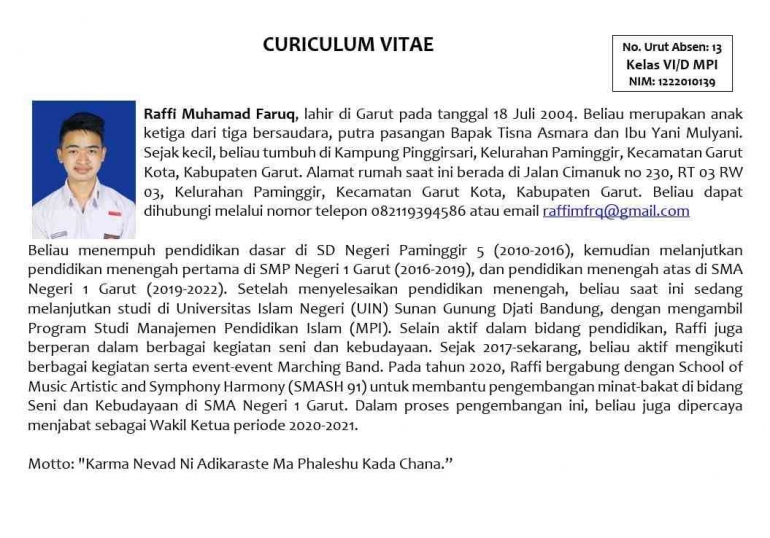(by Raffi Muhamad Faruq/MPI Student/S1 Class 6D UIN Sunan Gunung Djati Bandung)
In the era of globalization, Islamic education is increasingly required not merely to survive but to remain competitive at an international level. Nonetheless, there remains a significant gap between the foundational values of Islamic education and the efficiency-driven practices of modern educational management. Many Islamic educational institutions are not yet adequately responsive to global dynamics. Accordingly, this essay aims to critically examine four fundamental functions of educational management---planning, organizing, leadership, and quality assurance---within the framework of international Islamic education, with the intention of strengthening its relevance, adaptability, and strategic role in global contexts.
First: Educational Planning; Educational planning serves as the initial and strategic phase in ensuring institutional success. In a global context, planning within Islamic education must be attuned to transnational issues such as technological advancements, cultural shifts, and the erosion of ethical values. Effective planning is expected to be data-driven, needs-based, and future-oriented. It must incorporate contextual realities while preserving core Islamic principles. Without comprehensive and anticipatory planning, Islamic educational institutions are at risk of stagnation and irrelevance amidst the rapidly evolving global educational landscape.
Second: Organizing in Education; The organizing function entails the systematic allocation of human and material resources to achieve educational goals efficiently. On a global scale, organizing Islamic education involves harmonizing diverse cultural norms, administrative systems, and educational philosophies. A well-structured organizational framework---with clear roles, decentralization where needed, and strong coordination mechanisms---is essential. Furthermore, inter-institutional networks and collaborative international platforms are crucial to elevate Islamic education globally. Thus, effective organizing facilitates institutional synergy and enhances the capacity for global engagement and competitiveness.
Third: Educational Leadership; Leadership in Islamic education must transcend traditional administrative roles, evolving toward a transformative model. A leader in this context must possess both strategic foresight and deep ethical grounding rooted in Islamic teachings. Global educational leadership requires intercultural sensitivity, adaptive thinking, and the capacity to foster innovation while maintaining spiritual integrity. Such leadership promotes a positive organizational culture, encourages collaboration, and positions the institution as a credible contributor to international educational discourse. Hence, effective leadership is indispensable in shaping globally competent, ethically driven Islamic educational institutions.
Fourth: Supervision and Quality Assurance Systems; Supervision and quality assurance constitute essential mechanisms for continuous improvement and institutional accountability. In an international setting, quality assurance must be adaptable yet aligned with standardized indicators such as accreditation systems, academic audits, and performance-based evaluations. Supervision should not be punitive but formative---intended to foster growth, transparency, and institutional excellence. Islamic educational institutions must implement robust internal monitoring systems while remaining open to global benchmarking practices. In doing so, they ensure the production of graduates who are both professionally competent and grounded in Islamic ethical frameworks.
The effective integration of the four core management functions---planning, organizing, leadership, and quality assurance---is fundamental to the advancement of global Islamic education. When applied coherently and guided by Islamic epistemology, these functions enable institutions to remain relevant, responsive, and competitive on a global scale. Advancing Islamic education requires not only managerial innovation but also collective vision, international collaboration, and unwavering commitment to quality. Ultimately, a well-managed Islamic education system can serve as a beacon for global civilization, contributing constructively to the moral and intellectual landscape of the modern world.
*)This article is extracted from the Teaching Material Module of the International Islamic Education Management Course Part 6 by Prof. A. Rusdiana, M.M

Follow Instagram @kompasianacom juga Tiktok @kompasiana biar nggak ketinggalan event seru komunitas dan tips dapat cuan dari Kompasiana. Baca juga cerita inspiratif langsung dari smartphone kamu dengan bergabung di WhatsApp Channel Kompasiana di SINI









